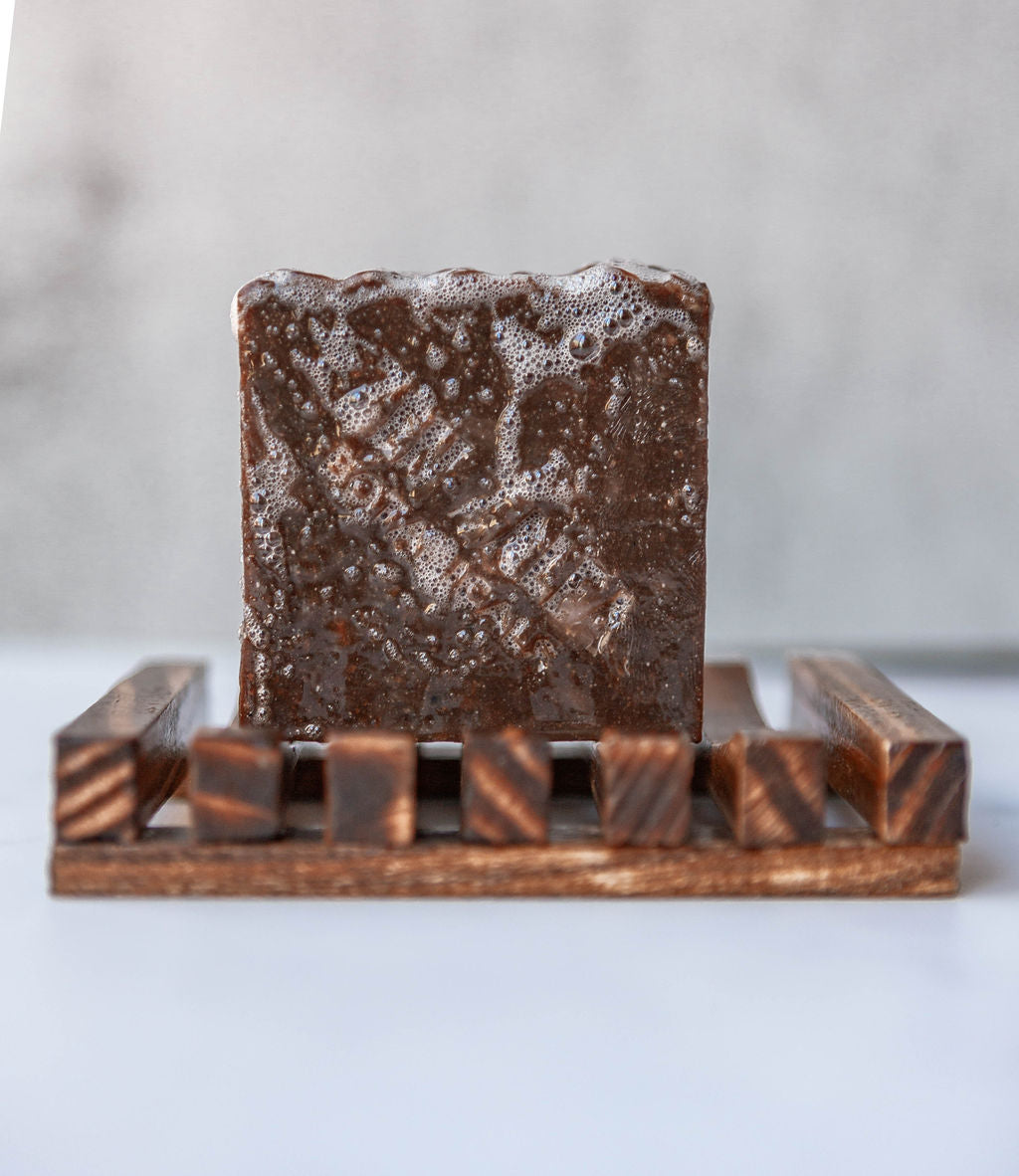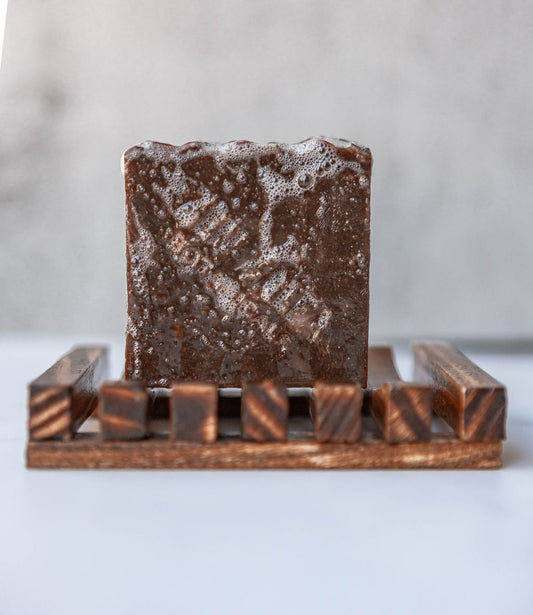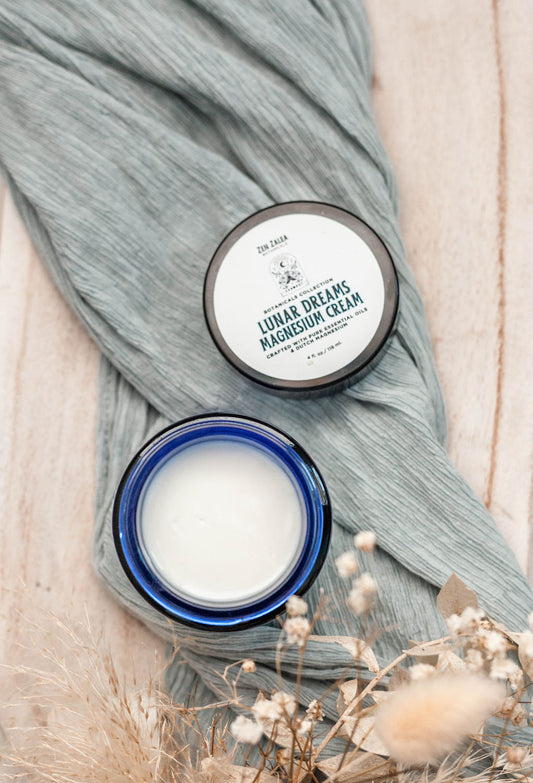Handmade Soaps for Soft, Healthy Skin
If you're looking for handmade soaps to help with soft, supple, healthy skin, the way the soap is made matters! Some people move away from using bar soaps at all because they're concerned about potential dryness. While there are bar soaps that can be drying, the right kind of soap will add moisture to your skin and have you feeling clean and hydrated.
There are two main ways bar soaps are made, which are hot process (HP) and cold process (CP). We make almost exclusively hot process soaps because they provide additional benefits and the lather is very popular with customers looking for soothing, moisturizing soap options. Both soap making methods can be good options, depending on your ultimate goal, but we find that hot process soaps give our customers more of what they're looking for.
Here's what to know about the two different kinds of soap and what they have to offer. When you understand what benefits both types of soap provide you can choose the one that's right for your needs. Our hot process soaps are designed to be hydrating and moisturizing, giving you soft-feeling skin. They also last a long time and smell great, so you'll get additional benefits to enjoy.
What Is Hot Process Soap?
Hot process soap is made by mixing oils and butters with lye (sodium hydroxide) and allowing the soap to saponify using heat to accelerate the saponification process. Our soaps are cooked in a slow cooker at 250F Degrees for between 2-6 hours depending on the batch size. Using heat speeds up the chemical reaction and cooks the active Lye out of the bars within a one-day process. The temperature at which the soap is created is the main difference between hot process and cold process soaps, but this makes a significant difference in the soap's qualities.
The Benefits of Hot Process Soap
When you're looking for hot process soap like ours you should know it has some big benefits you can enjoy. These include:
- Less Risk of Lye Residue: Because saponification is fully completed before pouring, there’s a lower risk of unreacted lye remaining in the soap, increasing the quality of the final product.
- Stronger Fragrance Retention: Essential & fragrance oils added after the cooking process retain more of their potency compared to cold process soaps becuase they do not undergo the chemical reaction phase.
-
Rustic, Textured Look: The thick consistency of hot process soap results in a rugged, natural aesthetic that fits our vibe and has a great feel to it.
Our handmade soaps look, feel, and smell great, and our goal is to make sure you can enjoy them to the fullest. Whether you're looking for soap for yourself or you want to buy a gift for a friend or family member, you can choose from a variety of our soaps.
What Is Cold Process Soap?
Cold process soap is made in the same basic way as hot process soap, but it's allowed to saponify at room temperature. This method requires patience, as the soap takes a minimum of 4 weeks to cure before use. Not only that, but it is much harder to provide as high of 'superfat' content at hot process soaps. This is because once they are poured into the mold, there is no ability to layer liquified shea butter within the soap batter after the saponification process, as we are able to do with our (HP) Soap, ultimately making the (CP) method unable to provide as much hydration for your skin.
Choosing cold process soap options means you can get a smooth surface, and can add layered patterns, swirls, and designs. You can also expect slightly longer-lasting, harder soap bars, as the slower curing time and lower fat content can make the bar more dense. These are important benefits of cold process soap to some, but they can't stand up to the hydrating properties of hot process options. If you've tried bar soaps and decided they weren't for you because your skin didn't feel comfortable or soft after using them, it's likely you were using cold process soaps and experienced drying effects.
Why We Choose to Create Hot Process Soaps
While Hot Process Soaps are more hands-on time for us to create due to the nature of the cooking process, we prefer them because they have a higher superfat and are more moisturizing than cold process soap options. They won't strip your skin of its natural oils or make you feel itchy after using. Not only that, but our hot process soaps double as a shaving cream for sensitive skin, and they are all dye free & colored with raw, natural clays and plant powders, including Turmeric, Charcoal, Kaolin clay, etc. These offer numerous skincare benefits, adding to the value of our great-feeling soap.
Which Soap is Best for You?
Choosing between hot process and cold process soap depends on your needs and preferences. If you want a fancy-looking soap with artistic designs or a firmer bar of soap, choose cold process options. However, if you want a handmade, rustic aesthetic that smells great and provides you with plenty of moisture, hot process soaps are the way to go.
Try a Bar of Hot Process Soap Today!
If you haven't tried hot process soap you haven't given bar soap a fair chance. We want you to feel the difference and see how our great soaps can improve the feel of your skin. Not only that, but we have amazing scents like Moonflower Nectar and Eucalyptus Mint. Made with essential oils and incredible scent blends you can fully enjoy your skincare experience when you try a bar of our hot process soaps. All of our soaps come in boxes so they're easy to store and make great gifts, too!
Share



